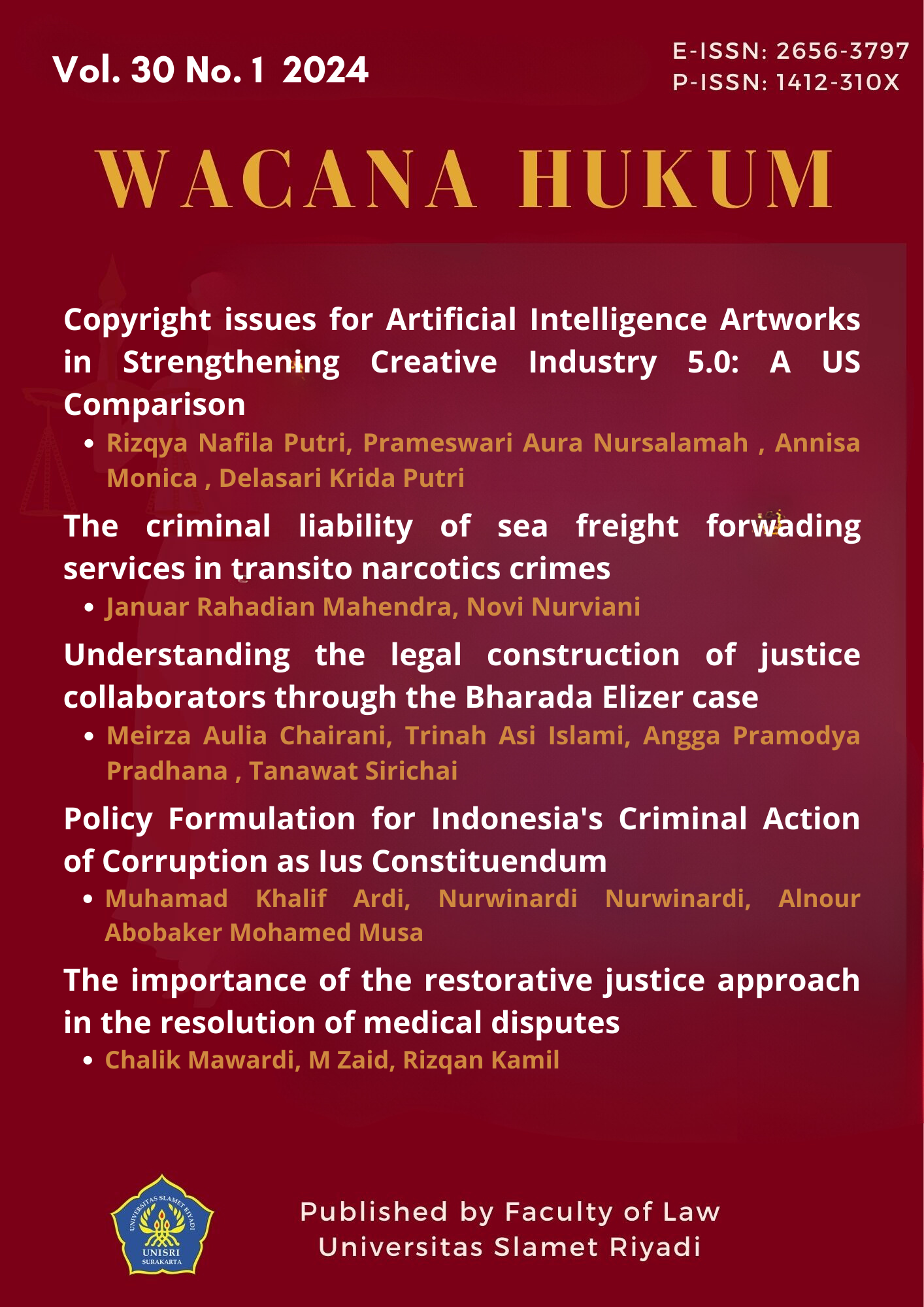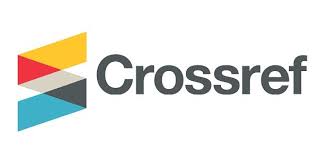Understanding the legal construction of justice collaborators through the Bharada Elizer case
DOI:
https://doi.org/10.33061/wh.v30i1.9828Keywords:
Justice Collaborator,, Court Decision, PoliceAbstract
The objective of this study is to ascertain Bharada Eliezer's stance on Decision Variety: 798/Pid.B/2022/PN.Jkt.Sel, which pertains to the position of Justice Collaborator police officers, as well as the Police Code of Ethics Decision concerning Bharada Eliezer's police status. This study employs a normative juridical research methodology, together with conceptual and statutory techniques. Essentially, when an individual unlawfully ends another person's life, it constitutes a violation of human rights and a denial of the right to life, particularly when the perpetrator is a law enforcement officer who continues to serve in the police force. However, in this particular case, the judge and the responsible official overseeing the KKEP hearing must take into account the defendant's status as a justice collaborator, who is feared by irresponsible parties and at risk of abuse. Ensure that all personnel of the National Police receive guidance to prevent them from engaging in actions that contravene laws, regulations, and the ethical standards of the police profession, which could damage the reputation of the police organization or agency. It is necessary to revise the requirements and guidelines for justice collaborators due to certain criminal offenses that pose a threat to the state and involve exceptional crimes. Justice collaborators play a crucial role in clarifying initially ambiguous criminal offenses.
References
REFERENCES
Agustini, Ni Ketut Sri Kharisma. “Analisis Unsur-Unsur Pasal 340 Kuhp Tentang Pembunuhan Berencanapada Kasus Pembunuhan Tragis Anggota Ormas Di Bali.†Universitas Udayana 53, no. 9 (2016): 1689–99.
Ampuno, S. “Perilaku Asertif Generasi Milenial Dalam Perspektif Psikologi Islam.†Journal of Behavior and Mental Health, 2020.
Bernadetha Aurelia Oktavira, S.H. “Polisi-Melakukan-Tindak-Pidana-Begini-Proses-Peradilannya,†2022. https://www.hukumonline.com/klinik/a/polisi-melakukan-tindak-pidana-begini-proses-peradilannya-cl4230.
Christian, Andi. “ANALISIS PELANGGARAN KODE ETIKPROFESI POLRI SEBAGAI LEMBAGAPENEGAKHUKUMDI INDONESIA.†Lex Administratum 11, no. 2 (2023): 1–13.
Dian Trisusilowaty, Anggita Doramia Lumbanraja Dan Suteki. “Ungsi Pengawasan Oleh Inspektorat Pengawasan Daerah Berbasis Pengaduan Masyarakat Dalam Perspektif Hukum Progresif.†Law Reform 15, no. 1 (2019): 32–34.
Effendi, E. Hukum Pidana Indonesia (Suatu Pengantar). Jakarta: PT. Refika Aditma, 2011.
Gunawan, Ilham. Postur Korupsi Di Indonesia Tinjauan Yuridis Sosiologis Budaya Dan Politis. Bandung: Angkasa, 1990.
Halif., Echwan Iriyanto dan. “Unsur Berencana Dalam Tindak Pidana Pembunuhan Berencana Kajian Putusan Nomor 201/Pid.B/2011/PN.Mrs.†Jurnal Yudisial 14, no. 1 (2021).
Komarudin, Y. “PENERAPAN JUSTICE COLLABORATOR DALAM PERADILAN PIDANA INDONESIA.†Retrieved, 2022. https://www.who.int/news-room/fact- sheets/detail/autism-spectrum-disorders.
Margaretha. “Mengapa Orang Melakukan Kejahatan?,†2013. https://psikologi.unair.ac.id/artikel-mengapa-orang-melakukan-kejahatan/.
Nyoman, Ni, Rina Desi, Anak Agung, and Sagung Laksmi. “Justice Collaborator Dalam Pengungkapan Kasus Tindak Pidana Pembunuhan†5, no. 1 (2023): 8–13.
Persada, Gading. “Kapolri-Ungkap-Alasan-Richard-Eliezer-Tak-Dipecat-Dari-Polri-Berani-Pertahankan-Kejujuran,†2023. https://www.kompas.tv/article/383662/kapolri-ungkap-alasan-richard-eliezer-tak-dipecat-dari-polri-berani-pertahankan-kejujuran.
Peter Mahmud Marzuki. Penelitian Hukum (Edisi Revisi). Edisi revisi 2. Jakarta: PT. Adhitya Andrebina Agung, 2015.
Philipus.M. Hadjon et al. Hukum Administrasi Dan Good Governance. Jakarta: Universitas Trisakti, 2012.
Pradana, Eflando Cahaya Chandan. “Proses Peradilan Terhadap Anggota Polri Yang Melakukan Tindak Pidana.†Varia Justicia 12, no. 1 (2016): 199.
Raharjo, Agus. “Hukum Dan Dilema Pencitraannya (Transisi Paradigmatis Ilmu Hukum Dalam Teori Dan Praktik.†Jurnal Hukum Pro Justitia 24, no. 1 (2006).
———. “Mediasi Sebagai Basis Dalam Penyelesaian Perkara Pidana.†Jurnal Mimbar Hukum UGM 20, no. 1 (2008).
Raharjo, Agus, and Angkasa Angkasa. “PROFESIONALISME POLISI DALAM PENEGAKAN HUKUM.†Jurnal Dinamika Hukum 11, no. 3 (September 25, 2011). https://doi.org/10.20884/1.jdh.2011.11.3.167.
Ramdan, Rama Ridial Allif. “Implementasi Keprofesionalitas Polri Dalam Profesi Polri†20, no. September (2022).
Sadjijono. Fungsi Kepolisian Dalam Pelaksanaan Good Governance. Yogyakarta: Laksbang Presindo, 2005.
Salmi. “Analisis Yuridis Peraturan Kepolisian No.Pol : 02 Tahun 2016 Tentang Penyelesaian Pelanggaran Disiplin Bagi Anggota Polisi ( Studi Penelitian Polres Palopo).†Jurnal I La Galigo | Public Administration Journal 3, no. 1 (2020): 58–62.
Saptohutomo, Aryo Putranto. “Karier-Bharada-e-Di-Polri-Bisa-Selamat-Jika-Divonis-2-Tahun-Penjara,†2023. https://nasional.kompas.com/read/2023/02/12/16065481/karier-bharada-e-di-polri-bisa-selamat-jika-divonis-2-tahun-penjara.
Soesilo, R. Kitab Undang-Undang Hukum Pidana (KUHP) (1995).
Soetarna, Dr. Drs. Hendar. Hukum Pembuktisn Dalam Acara Pidana. Bandung: PT Alumni, 2011.
Tempo. “Hasil-Sidang-Etik-Bharada-Richard-Eliezer,†2023. https://grafis.tempo.co/read/3245/hasil-sidang-etik-bharada-richard-eliezer.
Theresia Marthauli, Maria Heny Pratiknjo, Jetty E T Mawara. “Vol. 15 No. 2 / April – Juni 2022†15, no. 2 (2022): 1–18.
Utomo, W.H. Hukum Kepolisian Di Indonesia. Jakarta: Prestasi Pustaka, 2005.
Yusuf. “Peran Komisi Kepolisian Nasional Dalam Penegakan Kode Etik Kepolisian Negara Republik Indonesia.†Fundamental Jurnal Ilmiah Hukum 12, no. 1 (2023): 166–88. https://doi.org/https://doi.org/10.34304/jf.v12i1.108.
Downloads
Published
How to Cite
Issue
Section
License
Copyright (c) 2024 Meirza Aulia Chairani, Trinah Asi Islami, Angga Pramodya Pradhana , Tanawat Sirichai

This work is licensed under a Creative Commons Attribution-ShareAlike 4.0 International License.
Authors who publish with this journal agree to the following terms:
- Copyright on any article is retained by the author(s).
- The author grants the journal, the right of first publication with the work simultaneously licensed under a Creative Commons Attribution License that allows others to share the work with an acknowledgment of the work’s authorship and initial publication in this journal.
- Authors are able to enter into separate, additional contractual arrangements for the non-exclusive distribution of the journal’s published version of the work (e.g., post it to an institutional repository or publish it in a book), with an acknowledgment of its initial publication in this journal.
- Authors are permitted and encouraged to post their work online (e.g., in institutional repositories or on their website) prior to and during the submission process, as it can lead to productive exchanges, as well as earlier and greater citation of published work.
- The article and any associated published material is distributed under the Creative Commons Attribution-ShareAlike 4.0 International License

















.png)


